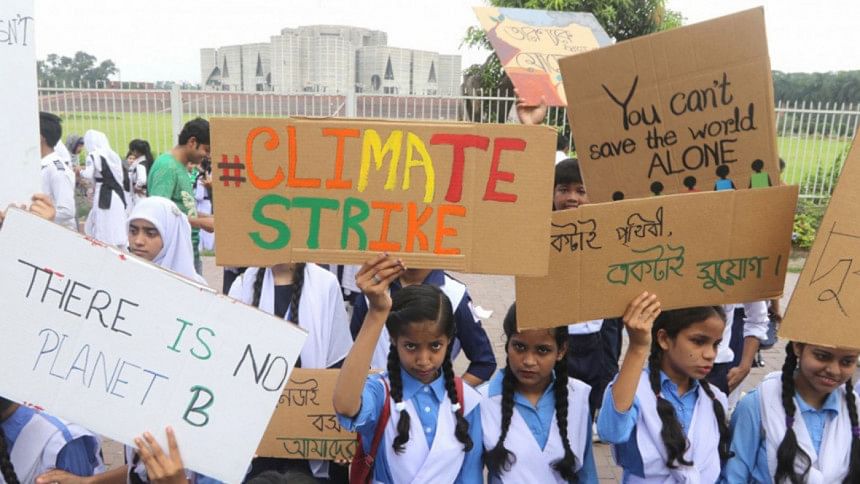Young people can be saviours in dealing with climate change

In just the last few days, there have been two major reports from the United Nations on the status of global climate change and our efforts to tackle it. The first was on the science of climate change impacts by the UN Intergovernmental Panel on Climate Change (IPCC) which, in its sixth assessment report, confirmed for the first time that human-induced climate change is now unequivocally an attributable reality all over the world, and that its impacts will get worse unless drastic actions are taken to reduce emissions of greenhouse gases and to keep global temperature below 1.5 degrees Celsius above what it was in the pre-industrial period. The time window for achieving this goal is closing in on us fast, as the global mean temperature has already gone up above one degree Celsius due to human-induced climate change.
The second report was published by the United Nations Children's Fund (Unicef), which highlighted the fact that over a billion children and youths around the world will be victims of the adverse impacts of climate change if we do not take urgent actions to prevent the worst impacts from occurring. Both the reports contained further information on the basis of region and country. In both cases, the South Asian region stands out as a particularly vulnerable one with nearly one and a half billion people at risk—of whom a very large proportion consists of children and youths.
The Secretary General of the UN, Antonio Guterres, has described these reports as a "Red Alert" for world leaders to step up their actions to tackle climate change through reducing emissions of greenhouse gases as quickly as possible, to stay below 1.5 degrees Celsius of warming and also to build the adaptive capacity of vulnerable populations in every country.
While these reports have painted a very dire picture of a crisis requiring emergency measures from all countries, there are ways for us to turn this challenge into an opportunity going forward.
The first point to make is that, globally, young people didn't cause the problem but will be the victims of their parents' failure to act when they could. This point has been made ad nauseam by teen Swedish climate activist Greta Thunberg, who started skipping school three years ago every Friday and sitting alone with a placard in front of the Swedish parliament in Stockholm. Since then, millions of schoolchildren have joined her Fridays for Future movement and every Friday, they go on strike in practically every country of the world.
The schoolchildren and youth in the South Asian region have also been quite active in joining this movement, as well as in other initiatives where the young people are being activated to not just protest but to start taking actions themselves.
In Bangladesh, Youth Net is an active part of this global initiative, amongst other youth groups who are becoming more responsive on the issue of tackling climate change.
One such global group is the Youth Adaptation Network (YAN) that was set up by the Global Center on Adaptation (GCA), which has its headquarters in the Netherlands and has a Regional office for South Asia in Dhaka, hosted by the government of Bangladesh. This South Asia regional office has already launched the YAN chapter in Bangladesh and in other countries of South Asia. The network is very active at the local level in not only raising awareness of adaptation to climate change, but also for taking actions, especially for locally-led adaptation where Bangladesh is an acknowledged world leader.
Thus, as the world is now entering the era of human-induced climate change and also loss and damage from the adverse impacts of climate change, Bangladesh—and South Asia, as a whole—can become world leaders in promoting actions on adaptation and share that knowledge and experience with the rest of the developing and developed world.
As the impacts of climate change become global and universal and even the richer countries are bound to be affected, they can learn from countries like Bangladesh on how to adapt more effectively to the adverse impacts.
Thus, over a short time, if we invest properly in capacitating our young girls and boys to become adaptation experts, they can not only help their own countries adapt but can also share that knowledge with countries around the world.
This should mean having climate change included in primary and secondary schools' curricula, and even more rigorously at the university level in all public and private universities in Bangladesh, and in South Asia at large.
Gopal Krishna Gokhale's age-old saying, "What Bengal thinks today India thinks tomorrow," can thus be modified to "what Bangladesh does today to adapt and build resilience to climate change, the rest of the world will learn and do tomorrow."
Saleemul Huq is Director of the International Centre for Climate Change and Development at the Independent University, Bangladesh.

 For all latest news, follow The Daily Star's Google News channel.
For all latest news, follow The Daily Star's Google News channel. 



Comments